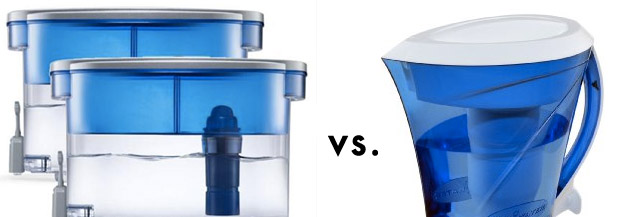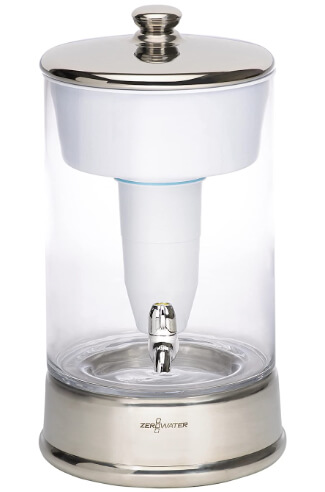Two of the most popular water filtration brands go head to head in this article. Below you will find a comparative analysis looking at effectiveness, design, cost, durability and taste. As with our other head to head match-ups, we make a clear recommendation.
UPDATE October 2022: It can be hard to admit when you are wrong about something. But it must be done. We gave PUR the edge in the comparison below. But times have changed. We now endorse ZeroWater over PUR, which is amusing to us as we were accused previously in the comments of being a possible public relations stunt for PUR. Well, we’ve switched our allegiance.
This is why we have switched our endorsement from PUR to ZeroWater
ZeroWater has dramatically improved their filtration. They now have a glass filter, which we love (we are all about glass as it ensures no bisphenol A (BPA), a harmful industrial chemical that is found in so many plastics or other microplastics from the vessel itself).
Their new 5-stage Ion Exchange Filtration system also removes microplastics and 99.9% of total dissolved solids generally. We haven’t seen the same evolution from PUR. In this battle, ZeroWater is the new winner.
Feel free to read our original article below, but understand that our opinion has changed and we no longer stand by what we wrote some years ago.
For the purposes of accurate comparison, we will look at the 23 cup ZeroWater dispenser (ZD-018) and the PUR 18 cup dispenser (DS-1800Z), because they have a similar capacity and design.
Which filter is more effective?
Answering this question is always difficult, because there are different categories of contaminants. ZeroWater puts a digital meter on their products that measures the amount of Total Dissolved Solids (TDS), and in their marketing material this is what they focus on.
However, what ZeroWater fails to mention is that their TDS meter focuses solely on inorganic substances. Furthermore, they don’t mention that their filter also removes beneficial minerals like calcium and magnesium. In other words, cysts and other organic contaminants may not be removed in sufficient quantities. PUR, on the other hand, does remove harmful organic contaminants.
ZeroWater may have had an edge in lead removal when they first released their products. Their ion exchange filter proved to be more effective in removing lead than the filters of Brita and PUR. However, PUR has since upped their game, making the claim that their filters reduce 99% of lead (we admittedly do not have independent verification of this).
No pour-through filter is capable of completely removing lead. Lead levels should already be adequately low (in terms of safe consumption) depending on your piping and your water hardness/softness. A filter will reduce the levels further, but not 100%.
There are a few other claims to examine in terms of effectiveness. ZeroWater has been certified by NSF to remove Chromium while PUR has not. It is unclear whether sufficient testing has been done on PUR products to determine where they stand.
Finally, there is the issue of traces of pharmaceuticals. This has become more and more of a problem in recent years, and PUR has a clear edge here. The ZeroWater filter is simply not designed to reduce the levels of pharmaceuticals. Furthermore, ZeroWater will not reduce contaminants like MTBE.
In conclusion:
- ZeroWater may reduce more overall inorganic dissolved solids. This comes at a cost, however, as calcium and magnesium will also be reduced.
- With heavy metals, we can say ZeroWater has a slight advantage, but the difference may be negligible.
- Both filters will reduce levels of chlorine, but neither will remove it entirely.
- In terms of removal of harmful organic compounds, PUR has a clear advantage.
Winner: PUR by a hair
Design
PUR and ZeroWater both advertise their products as well designed and highly functional. If you listen to consumers, however, one company is clearly outperforming the other. If you just take a look at the Amazon.com reviews, PUR has a clear advantage. For the pitcher filter in question, ZeroWater has an average four star rating with over 1,500 reviews. PUR has nearly 3,000 reviews and a 4.5 star rating. The most often cited issue with ZeroWater filters concerns their design.
ZeroWater filters are criticized for having a faulty spigot, filtering too slowly, and having a shape that is too tall for most conventional refrigerators. In our own personal test of the two filters, we found the PUR pitcher filter to be more efficient and easier to use overall.
Winner: PUR
Cost
ZeroWater and PUR filters are comparably priced, and while ZeroWater is a few dollars more, it also has slightly larger capacity. However, there is one area where ZeroWater becomes quite costly: the replacement filters. ZeroWater replacement filters are more expensive than those of PUR. What’s more, according to consumer testimony, you need to replace the cartridges for ZeroWater much more often. In fact, some consumers report having to replace them on a near-weekly basis. This could add up quickly. Once again, PUR has the edge.
Winner: PUR
Durability
Both of these products should be able to stand the test of time. While there are always a handful of people that end up with lemons, that is more an issue of bad luck than poor product design.
However, once again we have to point out that there have been repeated issues with the spigot on some of the ZeroWater dispensers. Many customers have reported that the spigot breaks easily or leaks. You see some of the same complaints for the PUR DS-1800Z, but far fewer overall. As we said earlier, the number one complaint for the ZeroWater dispenser concerns design, and this certainly has an effect on its durability.
Winner: PUR
Taste
This is one category in which ZeroWater may actually have an advantage. Due to its ion exchange filters, ZeroWater removes more dissolved solids, including minerals like magnesium and calcium, and produces water that is slightly acidic. The slightly acidic water is often rated higher in taste tests.
However, as we say throughout the site, taste can be a deceiving metric of water purity. It’s something that is important to consider, but it should never be a decisive factor.
Winner: ZeroWater
Overall Winner: PUR
In conclusion, the evidence is overwhelmingly in favor of PUR filters when compared to those of ZeroWater. If you have any thoughts on the matter, please reply in the comments below. Both products certainly have their supporters, and if there is anything we have missed, do let us know about it.








{ 8 comments… add one }